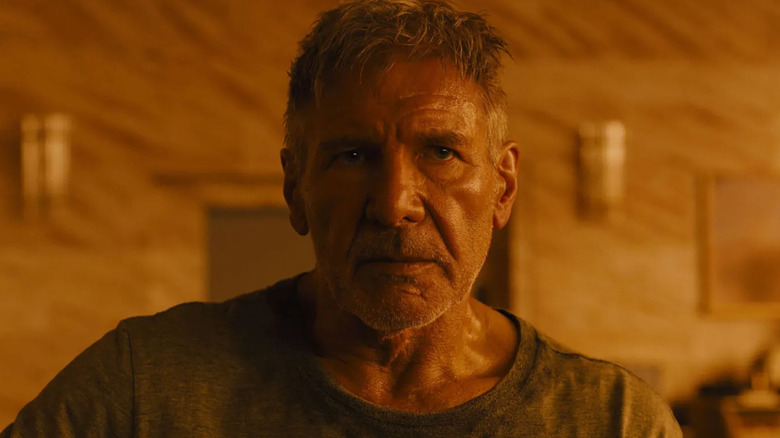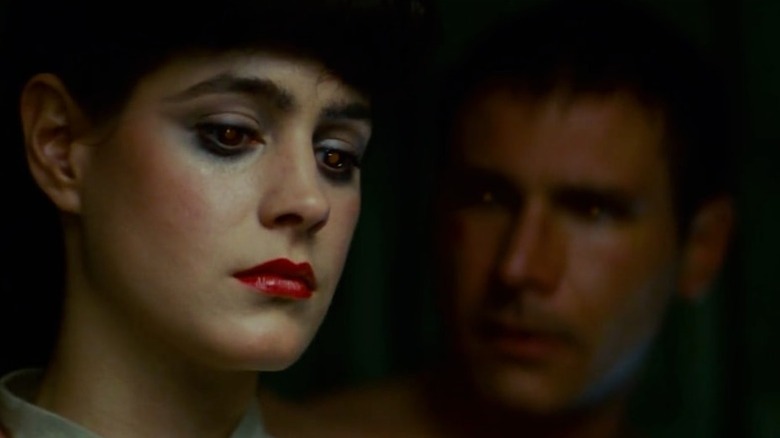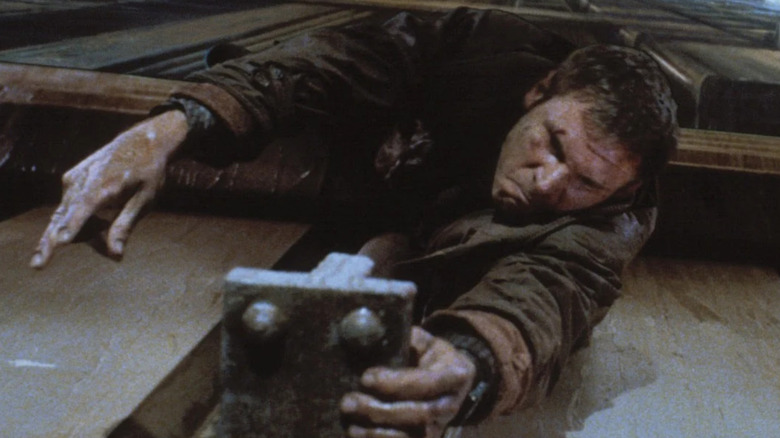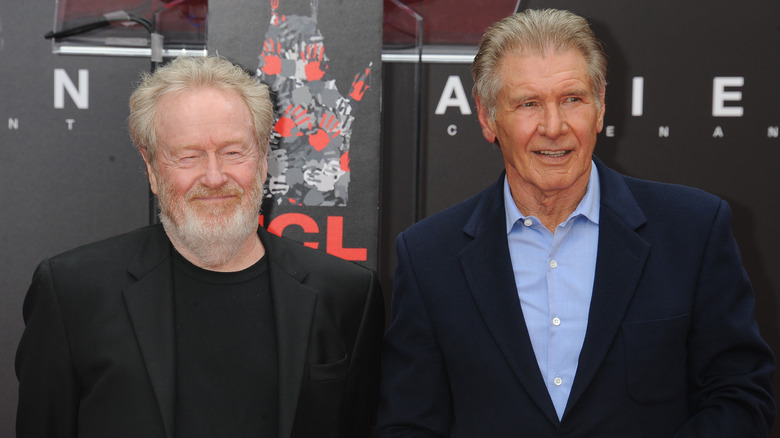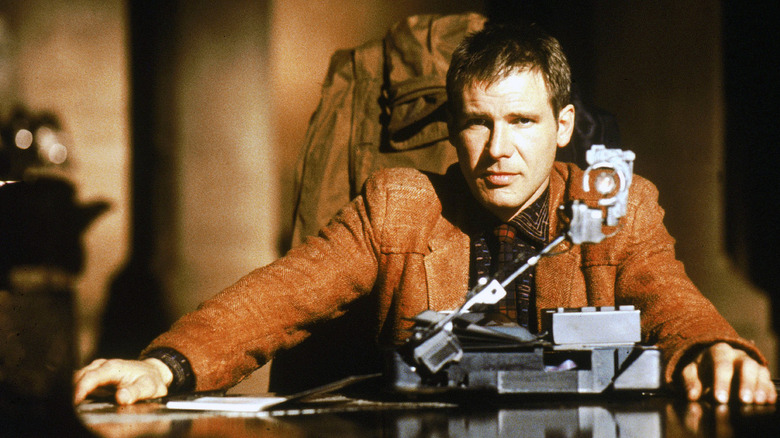Is Deckard A Replicant In Blade Runner? Every Clue We Have, Explained
In 1982, Ridley Scott broke new ground in science fiction once again, dabbling in the concept of artificial intelligence and what it means to be human — all while having Harrison Ford getting drenched in a futuristic city while Rutger Hauer makes speeches about tears in rain. The film was "Blade Runner," now deemed as one of the greatest science fiction films of all time, with Scott's visual flair engulfing every frame with smoke and neon. While the aesthetics and techno-lit landscape would be replicated in other mediums in the years that followed, there was one detail that couldn't be matched, simply because the world didn't have a definitive answer to it. Even with its iconic Spinner cars zipping through the skies, a city that was bellowing fire, and oversized adverts for Coca-Cola, the biggest detail that had fans itching for clarification was regarding the film's hero Rick Deckard. They wondered whether or not, after spending an entire film hunting down Replicants, he was one himself.
It was even one of the biggest unanswered questions in "Blade Runner 2049," when Denis Villeneuve took on the unthinkable task of giving the beloved sci-fi movie a sequel. The matter of Deckard's origins are left in very murky territory, but where is the evidence that fans stand by with such fervor, and is there enough to confirm what they've always thought?
Some Blade Runner fans are convinced Deckard is a replicant
"'More human than human,' is our motto" according to owl-loving creator Eldon Tyrell. If details in Scott's original movie are anything to go by, Deckard might be one of his finest creations. The most glaringly obvious points that confirm he's a replicant became more prominent in the 1992 Director's Cut, when the tin foil unicorn that Deckard finds at his feet was added in the film's closing moments. Throughout the Director's Cut and then eventually included in the 2007 "Final Cut," Deckard has dreams of a unicorn, with the only glimmer of it in the real world being one of Gaff's (James Olmos) origami creations. The implication here is that Deckard's private dreams aren't private at all, and that they're actually part of his programming that Gaff is fully aware of.
Another detail is all in the eyes of replicants. While it's never actually said outright in the film, the Nexus-8 series androids appear to have a tell that proves they aren't human: a shimmer that appears in their eyes. Light hits the peepers of both Batty and Rachel just right to give them an otherworldly tint, giving away that these characters are replicants. However, the same thing happens when Deckard is with Rachel, potentially confirming that he's another model as well. All that aside, though, there's just as much evidence to suggest that Deckard is just a normal man who's good at his job.
There is compelling evidence Deckard is NOT a replicant in Blade Runner
Sometimes, the most obvious details are the ones that can be just as quickly overlooked, and that includes evidence that confirms Deckard is human after all. There might be moments that Deckard's eyes appear similar to Rachel and Batty's, but it's in Deckard's moments of weakness that strengthen the argument he isn't a replicant.
While the debate of Deckard's dream being programming that Gaff is aware of suggests he might be an android, the fact that other replicants don't mention having dreams suggests he isn't one. Then there's the showdown with his final target in the movie that fortifies he's a flawed creature just like the rest of us, thanks to the absolute hammering he takes from Batty.
When the Blade Runner meets his final target, it leads to a harrowing confrontation that sees Ford's character get his fingers broken, his head knocked around repeatedly, and struggle to stay on top. Batty even pulls Deckard up after a failed jump, displaying the superior strength of the Nexus-8 model over his hunter. If Deckard really is a replicant, then he's a pretty inferior one compared to the other versions. Even so, the debate on Rick's point of origin is something that Ridley Scott and Ford have argued over for decades.
Ridley Scott and Harrison Ford argued on whether Deckard was a replicant for Blade Runner 2049
During the production of "Blade Runner," the truth about the film's lead character was a heated topic between its star and the director. According to journalist Paul M. Sammon, who visited the set (via Vanity Fair), Harrison Ford's temper often got the better of him when he found Ridley Scott leaving key pieces in the film to suggest that there was more to Deckard then met the occasionally reflective eye, which the actor was against.
When it came to filming the crucial unicorn scene that implied Deckard's dreams weren't of his own making, Ford only caught at the last minute what Scott was up to. According to Sammon, Ford jumped on the sequence immediately, yelling at his collaborator, "I thought we said I wasn't a replicant!"
Over the decades later, the debate continued according to "Blade Runner 2049" director Denis Villeneuve, who broke down his thoughts on the matter with CinemaBlend. "That's an interesting thing to me. I really love that. Again, Harrison and Ridley are still arguing about that. If you put them in the same room, they don't agree. And they start to talk very loud when they do. It's very funny." It took until 2023 for Ford to finally cave in and accept a truth that he'd chosen to ignore for so long.
Harrison Ford finally accepts that Deckard is a replicant
He might have fought hard to keep Deckard being a man of flesh and blood originally, but in an interview with Esquire, the legendary actor finally gave in and accepted that he'd secretly always known the truth, even if he didn't want it to be. "I always knew that I was a replicant," Harrison Ford confessed. "I just wanted to push back against it, though. I think a replicant would want to believe they're human. At least this one did."
It's a valid point given that the story tackles the important matter of what it means to be human, which Ridley Scott would later try to revisit in the likes of "Prometheus" and "Alien: Covenant," albeit not earning the same revered reception. For Ford, it was important for him that Deckard stayed the one genuine article among a rogues gallery that weren't. In 2017, Ford told Vanity Fair, "I felt that the audience needed to have someone on-screen that they could emotionally relate to as though they were a human being."
But then, perhaps that really is the point of "Blade Runner" and its now equally beloved sequel. That being human is up for debate, even when the hero at the center of it all might not be.
To read more about the classic sci-fi film, check out the untold truth of "Blade Runner."
